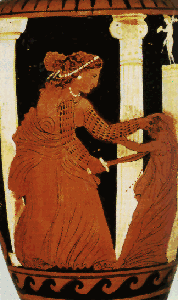 MEDEA
MEDEA
the price of wisdom
Medea, the daughter of Aetes, son of Helios, and of Eidyia, daughter of
Okeanos, was a very ancient goddess. Her name, which is etymologically
connected with metis (wisdom), itself derived from the verb medomai,
that is 'think, contrive, conspire', defines her essence.
Goddess of intelligence and good counsel, Medea was obliged to leave her
home and follow a mortal. Jason, the darling of the gods, armed with the
magic of love, which he had been taught by Aphrodite herself, won
Medea's heart, and Argo, the first ship, brought her to the land of
mortals.
 Wise prophetess and sorceress, she proved a valuable helper and faithful
companion, removing obstacles and frequently saving the Argonauts from
certain disaster. Alone of all the female figures in Greek mythology,
she played a leading role in many adventures and formed a source of
inspiration for poets and artists, who portrayed her, in contrast with
other heroines, as an active subject, not a passive object.
Wise prophetess and sorceress, she proved a valuable helper and faithful
companion, removing obstacles and frequently saving the Argonauts from
certain disaster. Alone of all the female figures in Greek mythology,
she played a leading role in many adventures and formed a source of
inspiration for poets and artists, who portrayed her, in contrast with
other heroines, as an active subject, not a passive object.
Ancient epic poetry hymned the miracles of Medea, who knew how to bring
Jason back to life and how to rejuvenate the aged Aeson, boiling them in
her golden cauldron with her miraculous herbs. Detestable though death
and old age may be, however, they are part of the law of nature. To
abolish them implied the overturning of the order of the world, and was
therefore an act of anarchy and, as such, dangerous.
As the influence of rationalism increased, so the figure of Medea
acquired an increasing number of dark aspects. Her admirable history
changes, and we learn of a ram which was cut up into pieces and emerged
as a live lamb from the magic cauldron. This miracle, however, was a
trap set by the sorceress to persuade the daughters of Pelias to kill
their father, who had usurped Jason's throne.
In tragedy, Medea assumed the role of the wicked stepmother who, as wife
of Aegeus, king of Athens, used her art to poison Theseus. The hero
discovered the ruse, however, and expelled the sorceress from the city
of Law and Reason.
In 431 BC, Euripides gave Medea a new, moving dimension that was to
define her image over the centuries. In his tragedy Medea, the ancient
goddess, the heroine of earlier mythology, acquired flesh and bones and
became a betrayed woman who, having given more than could have been
demanded of her, was now cast aside like an old rag. And, in her wisdom,
she set out to exact vengeance for the tribulations and injustices
suffered by her sex.
By killing the children she had borne him, and by depriving him of the
ability to have more, Medea condemned her unfaithful husband to social
castration. Her carefully planned and cold-bloodedly executed action
went to the heart of the problem, showing the extreme consequences of a
system which, based on the inequality and polarisation of the sexes, was
so irrational as to regard children as the possession of the father, and
legally 'alien' to the mother.
By standing natural and human law completely on its head, and
experiencing the greatest possible suffering and pain, Medea found
expiation. Cold and distant, divinely inaccessible, she appears at the
end of the tragedy, speaking from the machina, standing in the chariot
of Helios, the sun-god, about to abandon the world of mortals for ever.